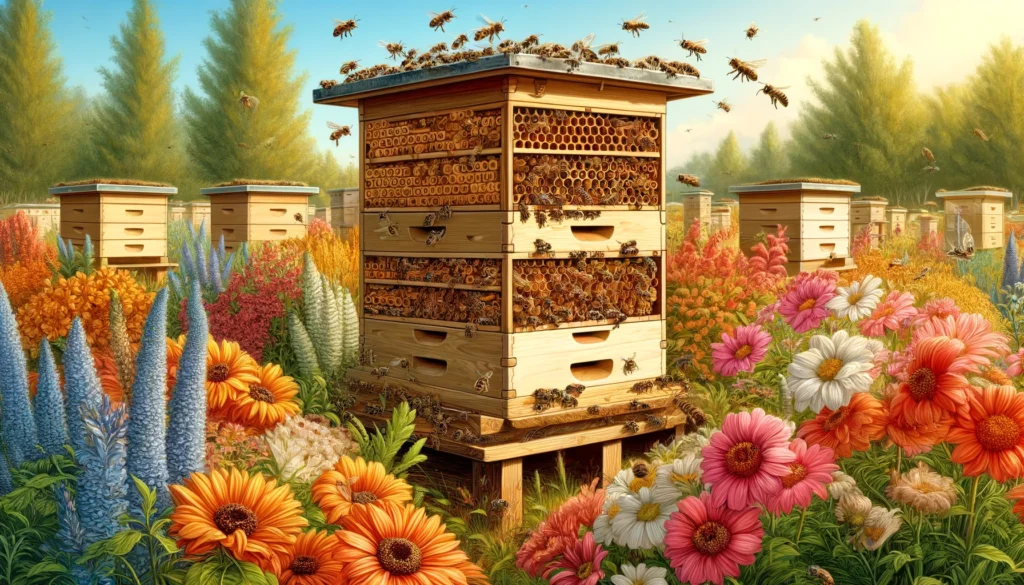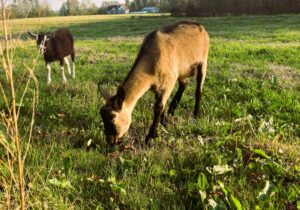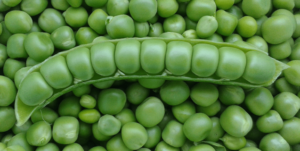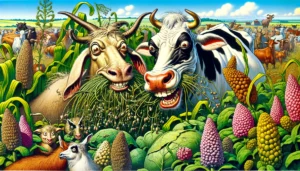
Bee Super A detailed and educational illustration showcasing a bee super also known as a honey super or honey super box used in beekeeping. The image features.webp.webp
Beekeeping: Sustainable Apiculture for Honey Production and Pollination Services
Definition:
Beekeeping, also known as apiculture, involves the management and cultivation of honey bee colonies for the production of honey, beeswax, pollen, propolis, royal jelly, and other hive products, as well as for pollination services in agriculture and ecosystem maintenance. It encompasses a range of activities, techniques, and hive types, each tailored to meet the needs of beekeepers and the requirements of honey bee colonies.
Informative Details:
Beekeeping is an ancient and essential agricultural practice that plays a crucial role in food production, biodiversity conservation, and ecosystem health. Honey bees are valuable pollinators of many crops and wild plants, contributing to the reproduction and productivity of fruits, vegetables, nuts, seeds, and flowers. In addition to their pollination services, honey bees produce honey, beeswax, and other hive products that are valued for their nutritional, medicinal, and industrial uses.
Fall off the barn roof and busted your keister? Life on the farm or ranch can be tough on the bum. Need a break? Laugh it off at FarmerCowboy.com, the #1 farm humor site. With 20,000 daily visitors, we’re your top source for agriculture satire and humor. Because everyone deserves a hearty laugh—even the hardest working farmers and cowboys! Join us and turn those long days into fun tales at FarmerCowboy.com.
Valuable Assistance:
Beekeeping offers numerous benefits for beekeepers, farmers, and the environment, including a sustainable source of honey and hive products, improved crop yields and quality, and ecosystem services such as pollination, habitat restoration, and biodiversity conservation. Honey and other hive products are valued for their flavor, aroma, and health benefits, making them popular ingredients in food, cosmetics, and traditional medicine.
Beneficial Guidance:
Beekeepers can benefit from a variety of resources, technologies, and support services available to improve their beekeeping practices and enhance hive productivity and health. From beekeeping associations and extension programs to research institutions and certification courses, there are numerous opportunities for beekeepers to access training, information, and expertise to help them succeed in beekeeping.
Actionable Suggestions:
- Hive Management: Regularly inspect beehives to assess colony health, population dynamics, and productivity. Monitor hive conditions, pest and disease levels, and environmental factors to identify and address issues promptly. Implement integrated pest management (IPM) strategies, hive sanitation practices, and disease prevention measures to maintain healthy and resilient honey bee colonies.
- Pollination Services: Offer pollination services to farmers and growers to enhance crop yields and quality. Coordinate with agricultural producers, orchardists, and greenhouse operators to provide honey bee colonies for pollination during bloom periods. Ensure proper hive placement, timing, and management to maximize pollination efficiency and effectiveness.
- Honey Production: Harvest honey and other hive products using sustainable and ethical practices that prioritize bee welfare and hive health. Extract honey using gentle methods that minimize stress and disturbance to bees. Store and process honey and beeswax products in hygienic and food-safe conditions to maintain quality and purity.
- Community Engagement: Engage with local communities, schools, and organizations to raise awareness about the importance of bees and beekeeping for food security, biodiversity conservation, and ecosystem health. Offer educational programs, workshops, and hive tours to share knowledge and inspire interest in beekeeping and pollinator conservation.
- Environmental Stewardship: Implement land management practices that support bee-friendly habitats and forage resources for honey bees and native pollinators. Plant pollinator-friendly flowers, trees, and shrubs that provide nectar and pollen throughout the growing season. Minimize pesticide use and exposure by adopting integrated pest management (IPM) practices and choosing bee-safe alternatives.
Helpful Content for Beekeepers:
Beekeeping offers a rewarding and environmentally beneficial pursuit for individuals interested in sustainable agriculture, conservation, and community engagement. By adopting best management practices, promoting bee health and welfare, and advocating for pollinator-friendly policies and practices, beekeepers can contribute to the resilience and sustainability of honey bee populations and the ecosystems they support.
References:
Originally posted 2015-08-23 11:48:28.
Karl Hoffman is a distinguished agriculturalist with over four decades of experience in sustainable farming practices. He holds a Ph.D. in Agronomy from Cornell University and has made significant contributions as a professor at Iowa State University. Hoffman’s groundbreaking research on integrated pest management and soil health has revolutionized modern agriculture. As a respected farm journalist, his column “Field Notes with Karl Hoffman” and his blog “The Modern Farmer” provide insightful, practical advice to a global audience. Hoffman’s work with the USDA and the United Nations FAO has enhanced food security worldwide. His awards include the USDA’s Distinguished Service Award and the World Food Prize, reflecting his profound impact on agriculture and sustainability.






